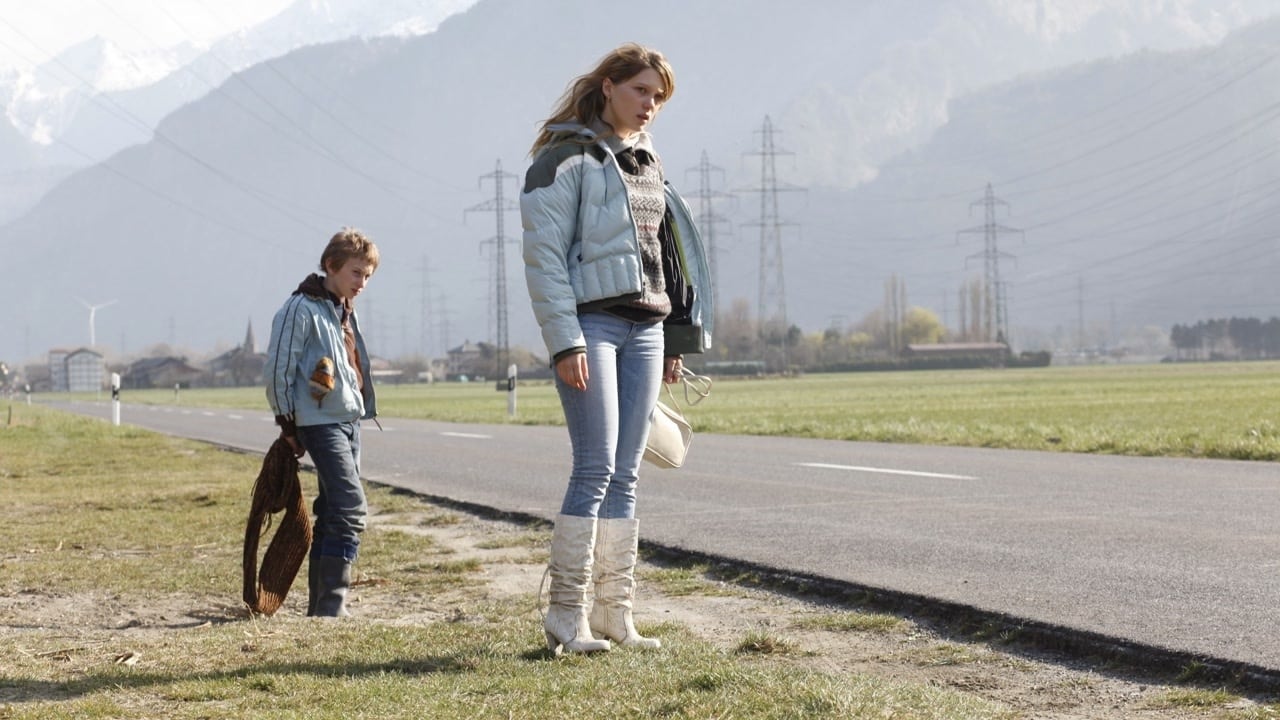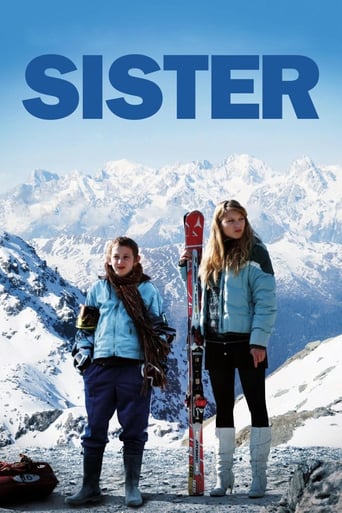

Too much of everything
... View MoreAbsolutely Fantastic
... View MoreThis is a must-see and one of the best documentaries - and films - of this year.
... View MoreMostly, the movie is committed to the value of a good time.
... View MoreSimon (Kacey Mottet Klein) is a thief stealing from the foreigners at the ski resort. He lives with his aimless irresponsible sister Louise (Léa Seydoux). She's left yet another job and has questionable relationships. He gets caught by resort worker Mike (Martin Compston) but instead he starts selling the stolen skis to him. He takes bigger and bigger risks. He's an expert liar. He befriends resort patron Kristin Jansen (Gillian Anderson) pretending to be a rich kid.It's a pretty good performance from Kacey of a ballsy character. It does need to amp up the danger for the boy. While the reveal is great, it doesn't really raise the danger. Maybe if they could add a thug looking for money or children services looking to take Simon away. Also it would be great to dig deeper into Louise's problems. Overall this is a little bit disturbing but needs to raise the tension much higher.
... View MoreGlad to see so many positive reviews of this one. It's a fascinating, powerful film about two young people—a potty-mouthed artful dodger and a soft-faced older girl he calls "frangine" ("sis")—trying to live by their wits at a Swiss ski resort. Léa Seydoux's sulky beauty makes her perfect for the role of Louise; Kacey Mottet Klein, then barely into his teens, gives an amazing performance as Simon. Didn't recognize Gillian Anderson as the Englishwoman who takes a motherly interest. The slangy (not to say skanky) dialogue may be useful to students of advanced conversational French. Ursula Meier's first feature, "Home," is a total headtrip, longer on concept than plot and reminiscent of 50s absurdist satires of modern life by Ionesco and Jacques Tati; this one has real visceral impact. Both "Sister" and "Home" are available on streaming Netflix.
... View MoreFor scrawny 12-year-old Simon (Kacey Mottet Klein), life is up and down. Going up, however, does not mean moving up the ladder of success but only riding a cable car to do his "work" at the top of a mountain ski resort, a playground for wealthy tourists. Ursula Meier's heartbreaking Sister, Switzerland's submission for Best Foreign Film at this year's Oscars, is built around the continual movement of the cable car, moving up to the white wonderland of the glittering slopes, and down to the crumbling housing projects that look out on a desolate and muddy industrial plain. Like the marginalized poor in America, Simon is an unnoticed presence.He is a crafty entrepreneur whose work consists of stealing skis, gloves, goggles, sneaking in and out of locker rooms, emptying coat pockets and grabbing sandwiches and anything else he can from knapsacks to bring home to his older sister Louise (Lea Seydoux), a lay about in her early twenties who cannot hold a steady job and goes from one boyfriend to another. For Simon, a sled is not a fun ride in the snow but a means to stay alive, a tool to strap stolen skis and drag them down below to restore and repair so he can sell them to the highest bidder. Simon, of course, rationalizes his actions by saying "They don't miss them. They just go and buy new ones." Supported by a solid script by the director and Antoine Jacquod and the striking cinematography of Agnés Godard (Beau Travail, The Dreamlife of Angels), Sister takes place during the ski season from Christmas to Easter, as the camera peeks behind the glamour. When Simon is caught in the act of stealing by seasonal worker, Mike (Martin Compston), a friendly Scot, Mike automatically assumes that he's stealing to buy more hi-tech gadgets. Taken aback when he learns that the boy is stealing to buy food, toilet paper, and other necessities to keep him and his sister alive, he joins with him in his questionable activities.The early sequences have a bounce and energy that makes it feel as if the film may be moving in a comic direction, but comic it is not. This becomes very apparent in the film's second half when another (somewhat strained) dimension is added to our knowledge of Simon's love-hate bond with his sister, and we watch helplessly as their interaction changes from playful to a no holds barred display of anger and frustration. While some may see Simon as a criminal in training, Klein makes him lovable enough for us to view him as a confused little boy, desperate for affection, at times acting like an adult and at times a forlorn child. We know instinctively, however, that unless there is some sort of intervention, the path Simon is on will lead to a dead end.Unfortunately, however, there are no parents (foster or otherwise), no social workers, no schools or teachers in sight, not even police around to put up a stop sign. People walk by him as they pass by the homeless every day in the streets of most big cities, looking away, thinking "how sad." Nominated for Most Promising Actor at the 2013 César Awards, Kacey Klein's natural performance is one of remarkable depth and understanding. He does not emote or think the role, he lives in it and we are drawn into his life and experience his loneliness as our own. Also remarkable is Lea Seydoux who brings the irresponsible but ultimately sympathetic Louise to life.Based on Meier's memories of growing up near a ski resort near Geneva, Switzerland and her recollection of a little boy who was known as a thief, Sister is a devastating look at the result when an unwanted child is brought into the world. We discover how truly alone Simon is in scenes where he has to pay Louise to give him a hug, and when his neediness pushes him to cling to the mother of two boys (Gillian Anderson) who buys him lunch at the resort. If, as Victor Hugo said, "Life's greatest happiness is to be convinced we are loved," Meier makes it evident that growing up in a world without love, even the most skillful and resilient child cannot fill the gaping hole it leaves.
... View MoreIn Sister, a boy helps he and his sister survive by stealing from rich folks at a posh ski resort in the Swiss Alps. But the boy and his sister are both a bit more than each seems in this provocative psychological, daring thriller from Ursula Meier.Young Simon (Kacey Mottet Klein) has procured a season pass to a winter ski lodge. Each day, he rides up the giant lifts to the top of the mountain, where he swipes skis, poles, boots, gloves, and other paraphernalia, selling them to the less-fortunate in the town below. He does this to support he and his sister Louise (Lea Seydoux), an unfocused, somewhat-selfish wanderer who appears too have little concern for the well being of herself or for Simon, flitting from job to job and from lover to lover like a forlorn mosquito. So it's entirely up to Simon to keep them afloat, and he's a quick learner. Even at age 12, he can cook and clean and knows ski equipment better than even expert skiers, even though he is no skier himself. He's an entrepreneur, albeit in a dangerous career.He sells to workers. He sells to kids. He takes advance orders and knows how much to charge. He's not intimidated by anyone. He is, at his tender age, a master thief, knowing where to stow his ill-gotten gains and how best to get them back down the mountain. One can argue that he does what he has to do, since his youth prevents him from getting an authentic job and the adult in the family is wildly undependable. He takes on an apprentice at one point, goes into cahoots with another at a different juncture. But a few of his schemes do not end favorably for him. Simon is friendless, utterly alone. But his relationship with Louise is quite complicated. There are tender touches. Inappropriate remarks. Lingering glances. Is this simply typical preteen behavior, or something more? With no other friends - and apparently, no school to serve as a social function - Louise is about the only female with whom he interacts on a regular basis.He meets a visiting family - mom, two boys - at the resort. Mom is kind and buys Simon breakfast, even though he is loaded with cash. They bond a little; she seeing perhaps a lost soul whose story of no parents or siblings isn't ringing true, he seeing a mother figure he desperately desires.The twist in the movie makes its appearance just about halfway through. It's surprising that it arrives so early, and when it does it passes two crucial tests: it is both out of the blue and completely plausible. The perfect twist. Obviously, the twist coming so early in the film means that the movie's real enticement comes in this major revelation - well, a revelation to the audience, not to the characters. At first, we're not sure who is telling the truth; are we being snookered? When we discover the answer to that question, the relationship between Louise and Simon takes on a whole new dimension.Both Klein and Seydoux, playing characters who are almost aggressively opposite from one another, are phenomenal. Simon longs for a better life even as he excels in his current role. Louise, a tragic heroine, is mentally scarred, unsure, unhappy, and besieged by doubt. She seems of no use to him, and yet he pushes hard to make a life for them both.The ending is one of those that will leave half of the audience wondering if a reel was left off by mistake and the other half nodding appreciatively. It is not a neat ending; it is awash with symbolism of the direction each lead's life is headed. And set against the majestic beauty of the mountains, it is a strong, stark, and beautiful finale.
... View More